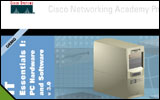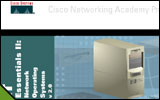|
|
 |
Cursuri
|
CCNA
( Cisco Certified Network Associate)
Cursul
este structurat în 4 module
(semestre)
si poate fi predat studentilor în minimum 6
luni si maximum 24 luni. Cursul le ofera studentilor
cunostintele necesare pentru a proiecta, instala si
administra retele de computere.
Cursul
este în totalitate de tip E-LEARNING –
ÎN LIMBA ENGLEZA - având
un sistem unic de testare si evaluare a cunostintelor
de care beneficiaza astazi peste 400,000 studenti
din peste 10.000 institutii de învatamânt
din 152 de tari din lumea întreaga.
Dupa
absolvirea fiecarui semestru se ofera o diploma care
atesta cunostintele acumulate, astfel încât
se usureaza gasirea unui loc de munca chiar înainte
de terminarea studiilor. La absolvirea academiei,
studentii obtin o diploma recunoscuta în întreaga
lume, cu care pot beneficia si de o reducere de 50%
a taxei de examen pentru certificatul CCNA. Examenul
CCNA se sustine la centrele autorizate din Romania
(www.2test.com,
www.vue.com
).
CCNA 1 - Networking Basics v 3.0
|
Module 1: Introduction
to Networking
1.1 Connection to the Internet
1.2 Network Math
Module 2: Networking Fundamentals
2.1 Networking Terminology
2.2 Digital Bandwidth
2.3 Networking Models
Module 3: Networking Media
3.1 Copper Media
3.2 Optical Media
3.3 Wireless Media
Module 4: Cabling Testing
4.1 Background for Studying Frequency-Based
Cable Testing
4.2 Signals and Noise
Module 5: Cabling LANs and WANs
5.1 Cabling the LAN
5.2 Cabling the WAN
Module 6: Ethernet Fundamentals
6.1 Ethernet Fundamentals
6.2 Ethernet Operation
Module 7: Ethernet Technologies
7.1 10-Mbps and 100-Mbps Ethernet
7.2 Gigabit and 10 Gigabit Ethernet
Module 8: Ethernet Switching
8.1 Ethernet Switching
8.2 Collision Domains and Broadcast Domains
Module 9: TCP/IP Protocol
Suite and IP Addressing
9.1 Introduction to TCP/IP
9.2 Internet Addresses
9.3 Obtaining an IP Address
Module 10: Routing Fundamentals
and Subnets
10.1 Routed Protocol
10.2 IP Routing Protocols
10.3 Mechanics of Subnetting
Module 11: TCP/IP Transport
and Application Layer
11.1 TCP/IP Transport Layer
11.2 TCP/IP Application Layer
|

CCNA 1 - DEMO |
|
sus
|
CCNA 2 - Routers and Routing Basics v 3.0
Module
1: WANs and Routers
1.1 WANs
1.2 Routers
Module 2: Introduction
to Routers
2.1 Operating Cisco IOS Software
2.2 Starting a Router
Module
3: Router Configuration
3.1 Configuring a Router
3.2 Finishing the Configuration
Module 4: Learning about
Other Devices
4.1 Discovering and Connecting to Neighbors
4.2 Getting Information about Remote Devices
Module 5: Managing Cisco
IOS Software
5.1 Router Boot Sequence and Verification
5.2 Managing the Cisco File System
Module 6: Routing and
Routing Protocols
6.1 Introduction to Static Routing
6.2 Dynamic Routing Overview
6.3 Routing Protocols Overview
Module 7: Distance Vector
Routing Protocols
7.1 Distance Vector Routing
7.2 RIP
7.3 IGRP
Module 8: TCP/IP Suite
Error and Control Messages
8.1 Overview of TCP/IP Error Message
8.2 TCP/IP Suite Control Messages
Module 9: Basic Router
Troubleshooting
9.1 Examining the Routing Table
9.2 Network Testing
9.3 Troubleshooting Router Issues Overview
Module 10: Intermediate
TCP/IP
10.1 TCP Operation
10.2 Overview of Transport Layer Ports
Module 11: Access Control
Lists (ACLs)
11.1 Access Control List Fundamentals
11.2 Access Control Lists (ACLs)
|

CCNA 2 - DEMO |
|
sus
|
CCNA 3 - Switching Basics and Intermediate Routing v 3.0
Module
1: Introduction to Classless Routing
1.1 VLSM
1.2 RIP Version 2
Module 2: Single Area
OSPF
2.1 Link-state Routing Protocol
2.2 Single Area OSPF Concepts
2.3 Single Area OSPF Configuration
Module 3: EIGRP
3.1 EIGRP Concepts
3.2 EIGRP Configuration
3.3 Troubleshooting Routing Protocols
Module 4: Switching Concepts
4.1 Introduction to Ethernet/802.3 LANs
4.2 Introduction to LAN Switching
4.3 Switch Operation
Module 5: Switches
5.1 LAN Design
5.2 LAN Switches
Module 6: Switch Configuration
6.1 Starting the Switch
6.2 Configuring the Switch
Module 7: Spanning-Tree
Protocol
7.1 Redundant Topologies
7.2 Spanning-Tree Protocol
Module 8: Virtual LANs
8.1 VLAN Concepts
8.2 VLAN Configuration
8.3 Troubleshooting VLANs
Module 9: Virtual Trunking
Protocol
9.1 Trunking
9.2 VTP
9.3 Inter-VLAN Routing Overview
|

CCNA 3 - DEMO |
|
sus
|
CCNA 4 - WAN Technologies v 3.0
Module
1: Scaling IP Addresses
1.1 Scaling Networks with NAT and PAT
1.2 DHCP
Module 2: WAN Technologies
2.1 WAN Technologies Overview
2.2 WAN Technologies
2.3 WAN Design
Module 3: PPP
3.1 Serial Point-to-Point Links
3.2 PPP Authentication
3.3 Configuring PPP
Module 4: ISDN and DDR
4.1 ISDN Concepts
4.2 ISDN Configuration
4.3 DDR Configuration
Module 5: Frame Relay
5.1 Frame Relay Concepts
5.2 Configuring Frame Relay
Module 6: Introduction to
Network Administration
6.1 Workstations and Servers
6.2 Network Management |

CCNA
4 - DEMO |
|
sus
|
IT
Essentials I
(Bazele tehnologiei informatice)
Cui se adreseaza:
Se adreseaza adultilor in curs de calificare sau recalificare,
studentilor, elevilor de liceu si elevilor din ultimele
clase de scoala generala.
Descriere:
In cursul IT Essentials, cursantii invata cum functioneaza
componentele hardware si software ale calculatoarelor,
care sunt cele mai bune practici in intretinerea calculatoarelor
si in utilizarea lor in siguranta. Prin activitati practice
si laboratoare vor invata sa asambleze un calculator,
sa instaleze sisteme de operare si software, sa depaneze
si sa intretina hardware-ul si software-ul.
Durata:
Cursul dureaza aproximativ 2 luni.
Cunostinte necesare:
Limba engleza, nivel mediu. Nu sunt necesare cunostinte
prealabile din domeniul calculatoarelor.
IT Essential I - PC Hardware and Software - v
3.0
Module
1: Information Technology Basics
Module 2: How Computers Work
Module 3: Assembling a Computer
Module 4: Operating System Fundamentals
Module 5: Windows 9x Operating Systems
Module 6: Windows NT/2000 Operating Systems
Module 7: Windows XP Operating System
Module 8: Multimedia Capabilities
Module 9: Advanced Hardware Fundamentals for Servers
Module 10: Networking Fundamentals
Module 11: Printers and Printing
Module 12: Preventive Maintenance and Upgrading
Module 13: Troubleshooting PC Hardware
Module 14: Troubleshooting Software
|

IT 1 - DEMO |
|
sus
|
IT
Essentials
II
Descriere:
Acest curs este un ghid intensiv in sistemele de operare
de retea multi-utilizator. Se vor discuta caracteristicile
sistemelor de operare Linux, Windows 2000, NT si XP.
Cursantii vor explora o varietate de teme incluzand
procedee de instalare, elemente de securitate, procedee
back-up si acces la distanta.
Durata:
Cursul dureaza aproximativ 2 luni.
IT
Essential II - Network Operating System- v 2.0
Module
1: Operation System Fundamentals
Module 2: Introducrion to Networking
Module 3: Physical Components of A Network
Module 4: TCP/IP Networking
Module 5: Overview of Network Services
Module 6: Introduction to Network Operating System
Module 7: Overview of the Installation Process
and Boot Process
Module 8: Windows 2000 Professional
Module 9: Linux
Module 10: Advance NOS Administration
Module 11: Network Security
|

IT 2 - DEMO |
|
sus
|
UNIX
(Bazele sistemului de operare UNIX)
Cui se adreseaza:
Se adreseaza studentilor, elevilor de liceu, sau adultilor
in proces de recalificare.
Descriere:
Comenzile de baza ale mediului UNIX, sistemul de fisiere
si directoare, drepturile , comenzile shell, editoare
text, utilizarea retelei.
Durata:
Cursul dureaza aproximativ 2 luni.
Cunostinte necesare:
Limba engleza, nivel mediu. Cunostinte de baza in utilizarea
calculatoarelor
Fundamentals
of UNIX - v 2.0
Module
1: The UNIX Computing Environment
Module 2: Accessing a System and UNIX Graphical
Interfaces
Module 3: Graphical User Applications
Module 4: Getting Help
Module 5: Accessing Files and Directories
Module 6: Basic Directory and File and Management
Module 7: Advanced Directory and File and Management
Module 8: File Systems and File Utilities
Module 9: Using Text Editors
Module 10: File Security
Module 11: Printing
Module 12: Backing Up and Restoring
Module 13: System Processes
Module 14: Shell Features and Environment Customization
Module 15: Introduction to Shell Scripts
Module 16: Network Concepts
Module 17: Career Guidance
|

UNIX - DEMO |
|
sus
|
Fundamentals of Wireless LANs
Fundamentals of Wireless LANs is an introductory course that will focus on the design, planning, implementation, operation and troubleshooting of wireless networks. It covers a comprehensive overview of technologies, security, and design best practices with particular emphasis on hands-on skills in the following areas:
- Wireless LAN setup & troubleshooting
- 802.11a & 802.11b technologies, products and solutions
- Site Surveys
- Resilient WLAN design, installation and configuration
- WLAN Security - 802.1x, EAP, LEAP, WEP, SSID
- Vendor interoperability strategies
This course will prepare students to achieve the Cisco
Wireless LAN Support Specialist designation.
Course Length: 2 months
Fundamentals
of Wireless LANs - v 1.0
Module 1: Introduction to Wireless LANs
Module 2: 802.11 and Network Interface Cards
Module 3: Wireless Radio Technology
Module 4: Wireless Topologies
Module 5: Router Intrusion Detection, Monitoring
and Management
Module 6: Bridges
Module 7: Antennas
Module 8: Security
Module 9: Security Translations and Connections
Module 10: Security ACLs
Module 11: Troubleshooting Management, Monitoring,
and Diagnostics
Module 12: Emerging Technologies
Appendix A1: The Physical Layer
|

Wireless - DEMO |
|
sus
|
Fundamentals of Network Security
Cursul este o introducere in securitatea retelelor si a proceselor de securizare. Se pune accept pe:
-
Design si management in securizarea retelelor
-
Tehnologii in securitare, produse si solutii
-
Firewall si designul, instalarea, configurarea si intretinerea securitatii unui router
- Resilient WLAN design, installation and configuration
-
Implementare AAA folosind routere si firewall
-
Implementare VPN folosind routere and firewall
Acest curs pregateste studentii pentru certificarea internationala MCNS (Managing Cisco Network Security) si CSPFA (Cisco Secure PIX Firewall Advanced) in pregatirea pentru "Cisco Firewall Specialist". Aceste examene sunt pasul spre certificarea CCSP (Cisco Certified Security Professional). Cei care vor termina cursul vor fi pregatiti si pentru certificarea CompTIA Security+.
Durata Curs: 3 luni
Fundamentals
of Network Security - v 1.1
Module 1: Overview of Network Security
Module 2: Basic Router and Switch Security
Module 3: Router ACLs and CBAC
Module 4: Router AAA Security
Module 5: Router Intrusion Detection, Monitoring, and Management
Module 6: Router Site-to-Site VPN
Module 7: Router Remote Access VPN
Module 8: PIX Frewall
Module 9: PIX Security Appliance Translations and Connections
Module 10: PIX Security Appliance ACLs
Module 11: PIX Security Appliance AAA
Module 12: PIX Advanced Protocols and Intrusion Detection
Module 13: PIX Failover and System Maintenance
Module 14: PIX VPN
Module 15: PIX Security Appliance Management
|

Network Security- DEMO |
|
sus
|
CCNA - BRIDGE Course
Cui se adreseaza:
Se adreseaza celor care au facut versiunea CCNA versiunea 2.1.4. si vor sa fie echivalati v 3.0
Descriere:
Cursul vine in completarea cursurilor CCNA v 2.1.4. Au fost adaugate ultimele tehnologii folosite la ora actuala in domeniul retelelor la nivel mondial.
Durata:
Intreg cursul (4 module) - 2 luni
Cunostinte necesare:
Cunostiinte CCNA din versiunea 2.1.4
CCNA 1 Bridge Course
Completion to the old modules :
Networking Media
Cable Testing
Ethernet Fundamentals
Ethernet Technologies
|

|
|
sus
|
CCNA
2 Bridge Course
Completion to the old modules :
TCP/IP Suite Error and Control Messages
Basic Router Troubleshooting
Access Control Lists (ACLs)
|

|
|
sus
|
CCNA
3 Bridge Course
Completion to the old modules :
Introduction to Classless Routing
Single Area OSPF
EIGRP
Switch Configuration
Spanning-Tree Protocol
Virtual LANs
Virtual Trunking Protocol
|

|
|
sus
|
CCNA
4 Bridge Course
Completion to the old modules :
Scaling IP Addresses
WAN Technologies
ISDN and DDR
Frame Relay
Introduction to Network Administration
|

|
|
sus
|
|
|
|




